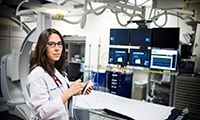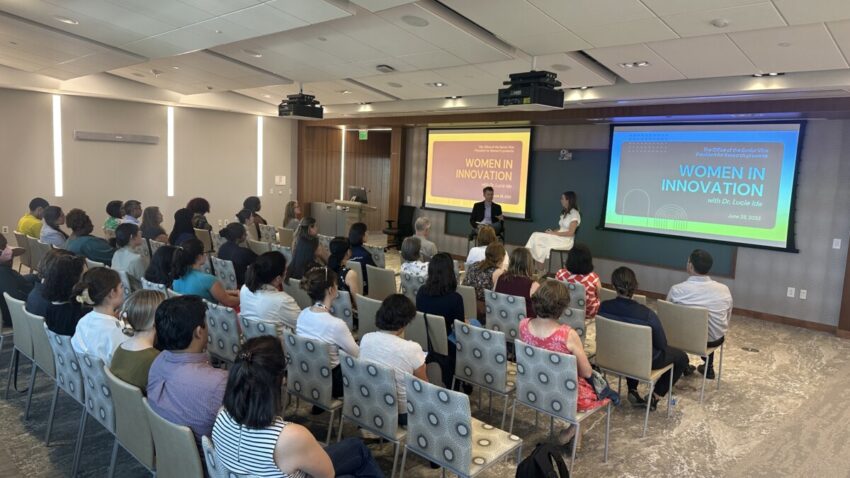This is the first installment of a series featuring the Female Founders Forum at Emory (F3@E). This year’s cohort members include Drs. Rasheeta Chandler, Elaine Fisher, Louise Hecker, Rebecca Levit, Cassandra Quave, Sarwish Rafiq, and Chunhui Xu.

Rebecca Levit, MD
Out of the estimated $283.3 billion venture capital (VC) allocated in 2022, start-ups with all-women teams received just $4.5 billion – less than 2% of the total funding. F3@E is one step that Emory University is taking in response to this disparity.
An initiative created by Deborah W. Bruner, Senior Vice President for Research, in partnership with Emory’s Office of Technology Transfer (OTT), F3@E aims to promote more women in entrepreneurship. Specifically, F3@E is intended to support the entrepreneurial development of female-identifying and nonbinary faculty at Emory who are launching a start-up company to license and develop their invention.
Through programming designed to sharpen entrepreneurial skills, networking opportunities, and knowledge sharing, the goal of F3@E is for its members to graduate with a technology development plan for a future or in-progress start-up. This year, the cohort is made up of eight female faculty. They’re just halfway through the program, but they’ve covered many important topics.
- Understanding intellectual property: The cohort met with the OTT team and got an introduction to IP ownership, inventorship, protection, and licensing. All members have previously disclosed an invention to OTT, so they’re familiar with IP, but this seminar served as a foundation for the rest of the program.
- Technology development planning: To prepare for their entrepreneurial journey, F3@E met with the Biolocity team to learn about non-dilutive funding sources. This is especially important for early-stage start-ups who cannot yet get VC funding.
- COI at Emory: These meetings attempt to introduce entrepreneurial topics members may not have thought about, and conflict of interest is an important, but sometimes overlooked, consideration. In this session, cohort members learned to balance their entrepreneurial agenda with research and clinical activities.
- Women In Innovation (WIN) speaker series: The Office of the Senior Vice President for Research invites exemplars of success to speak about the complexities of their journey. F3@E members have the opportunity to network, ask questions, and gain a clearer understanding of their future options.
Elaine Fisher, PhD, has found the programming useful, commenting, “Commercialization is a world different than research with a much faster pace and new skill set to learn. The monthly meetings provide useful insights into customer discovery, seeking funds, and consultation.”

Dr. Lucie Ide speaks to a crowd for the Women In Innovation speaker series.
In addition to the scheduled programming and mentoring, the F3@E cohort enjoys a small, supportive group setting in which questions and collaboration are encouraged.
“The highlight so far has been developing a community of female innovators through our cohort,” said Sarwish Rafiq, PhD. “Although we come from different backgrounds and research interests, I have gained a lot from their shared experiences.”
Above all, F3@E aims to get its members out of their comfort zones. While they may tend to network with only other scientists, members are now reaching out beyond their immediate circle for the benefit of their company. Who will be their CFO or CMO? How can they get to know them? The F3@E facilitators make introductions to make the journey for these female founders a bit smoother.
The program is only halfway finished, but there’s still much more to look forward to. Cohort members will continue to learn business skills, network, and refine their pitch – and female entrepreneurship at Emory will continue to thrive.
– Asher Alt